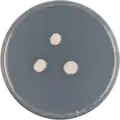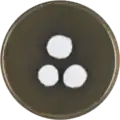Aspergillus brevipes
Aspergillus brevipes is an anamorph species of fungus in the genus Aspergillus.[1][3][5] It is from the Fumigati section.[6] It was first described in 1952.[2] It has been isolated from soil in Australia.[6] Aspergillus brevipes produces roquefortine C, meleagrin and viriditoxin.[7]
| Aspergillus brevipes | |
|---|---|
| Scientific classification | |
| Kingdom: | Fungi |
| Division: | Ascomycota |
| Class: | Eurotiomycetes |
| Order: | Eurotiales |
| Family: | Trichocomaceae |
| Genus: | Aspergillus |
| Species: | A. brevipes |
| Binomial name | |
| Aspergillus brevipes | |
| Type strain | |
| ATCC 16899, CBS 118.53, IFO 5821, IMI 51494, LSHBBB 263, LSHBSm 242, NRRL 2439, QM 1948[3] | |
| Varieties[4] | |
|
Aspergillus brevipes var. unilateralis | |
Growth and morphology
A. brevipes has been cultivated on both Czapek yeast extract agar (CYA) plates and Malt Extract Agar Oxoid® (MEAOX) plates. The growth morphology of the colonies can be seen in the pictures below.
 Aspergillus brevipes growing on CYA plate
Aspergillus brevipes growing on CYA plate Aspergillus brevipes growing on MEAOX plate
Aspergillus brevipes growing on MEAOX plate
References
- "Aspergillus brevipes". www.mycobank.org.
- Smith, G. 1952. Aspergillus brevipes n. sp. Transactions of the British Mycological Society. 35(4):241-242
- "Aspergillus brevipes". www.uniprot.org.
- "Aspergillus brevipes Taxon Passport - StrainInfo". www.straininfo.net.
- "Aspergillus brevipes Smith, anamorph ATCC ® 16899™". www.lgcstandards-atcc.org.
- Samson, R.A.; Hong, S.; Peterson, S.W.; Frisvad, J.C.; Varga, J. (2007). "Polyphasic taxonomy of Aspergillus section Fumigati and its teleomorph Neosartorya". Studies in Mycology. 59: 147–203. doi:10.3114/sim.2007.59.14. PMC 2275200. PMID 18490953.
- Frederic, Lamoth; William J., Steinbach (2016). Advances in Aspergillus fumigatus pathobiology. Frontiers Media SA. ISBN 978-2-889-19789-7.
Further reading
- Samson, ed. by Robert A.; Pitt, John I. (2000). Integration of modern taxonomic methods for penicillium and aspergillus classification. Amsterdam: Harwood Acad. Publ. ISBN 978-9-058-23159-8.CS1 maint: extra text: authors list (link)
- Watanabe, Tsuneo (2010). Pictorial atlas of soil and seed fungi morphologies of cultured fungi and key to species (3rd ed.). Boca Raton: CRC Press/Taylor & Francis. ISBN 978-1-439-80420-9.
- Richard J., Cole (1986). Modern Methods in the Analysis and Structural Elucidation of Mycotoxins. Oxford: Elsevier Science. ISBN 978-0-323-14853-5.
- Henderson, editors, John E. Smith, Rachel S. (1991). Mycotoxins and animal foods. Boca Raton, FL: CRC Press. ISBN 978-0-849-34904-1.CS1 maint: extra text: authors list (link)
- (ed.), Dietmar Schomburg; Ida Schomburg (2003). Springer handbook of enzymes (2. ed.). Berlin [u.a.]: Springer. ISBN 978-3-540-00519-3.CS1 maint: extra text: authors list (link)
This article is issued from Wikipedia. The text is licensed under Creative Commons - Attribution - Sharealike. Additional terms may apply for the media files.